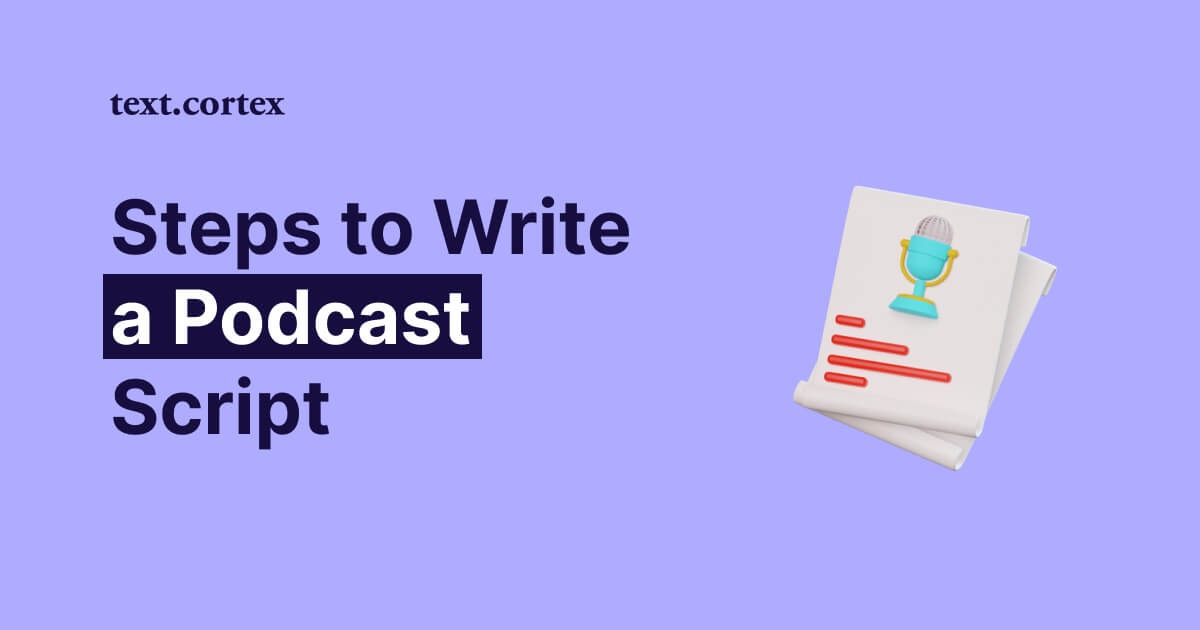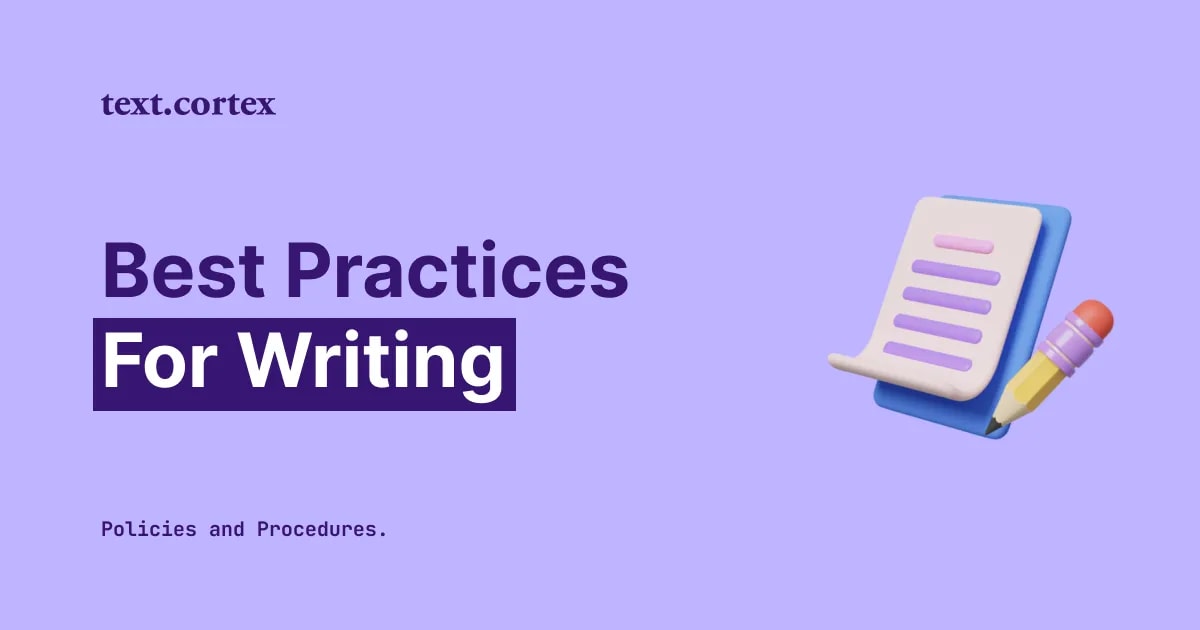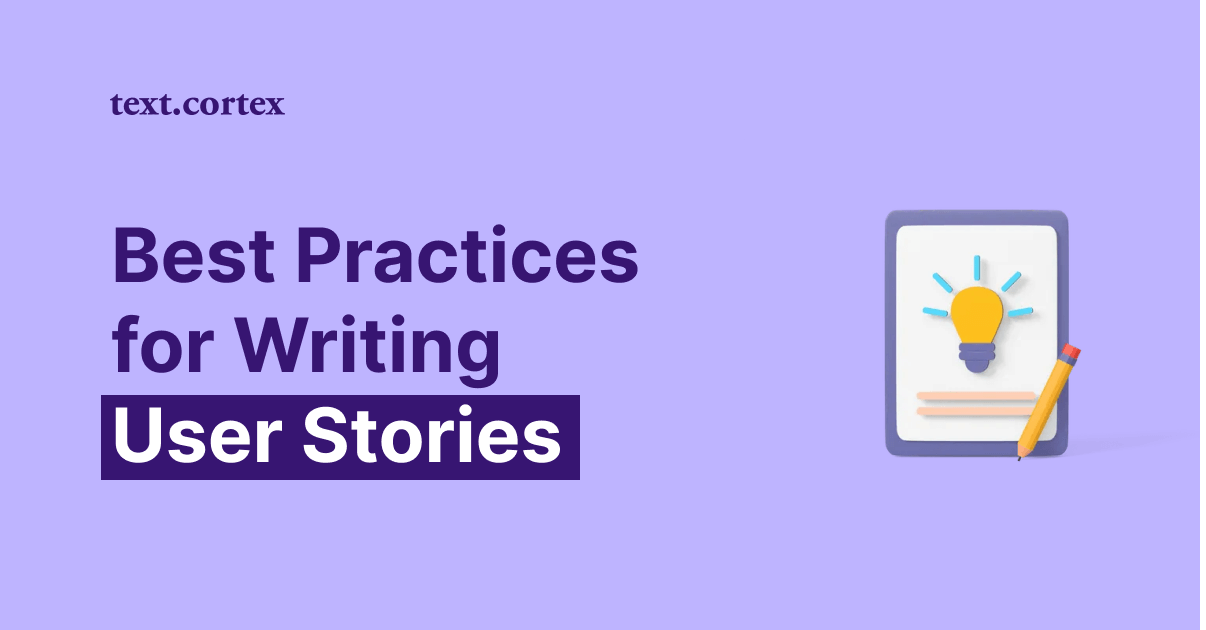Did you know that there are 5 million podcasts globally, and 464.7 million people are podcast listeners/viewers?
Sorting through podcasts and distinguishing the excellent from the mediocre can be challenging, especially considering what sets them apart.
Is it the content or visual effects?
Is it the host or the guest?
Creating a top-notch podcast starts with a solid script, and in this guide, we'll walk through the essential steps to write a podcast script in 2024.
Let’s begin!
What Do You Get With a Podcast Script?
A podcast script is one of the most crucial elements of producing a successful podcast, as without the script, a podcast can be unfocused, unclear, and uninteresting.
Here are a few reasons why a podcast script is so important:
- Provides structure and clarity, ensuring that the podcast stays on track and delivers a clear message to listeners.
- Having a podcast script allows better planning and preparation, reducing the likelihood of mistakes or confusion during recording.
- It helps to establish the tone and style of the podcast, making it more engaging and memorable for listeners.
- A podcast script can guide guests or co-hosts, ensuring everyone stays on topic and contributing valuable insights throughout the episode.
In short, a podcast script is essential for any podcast producer or host who wants to create a high-quality, engaging, and successful podcast.
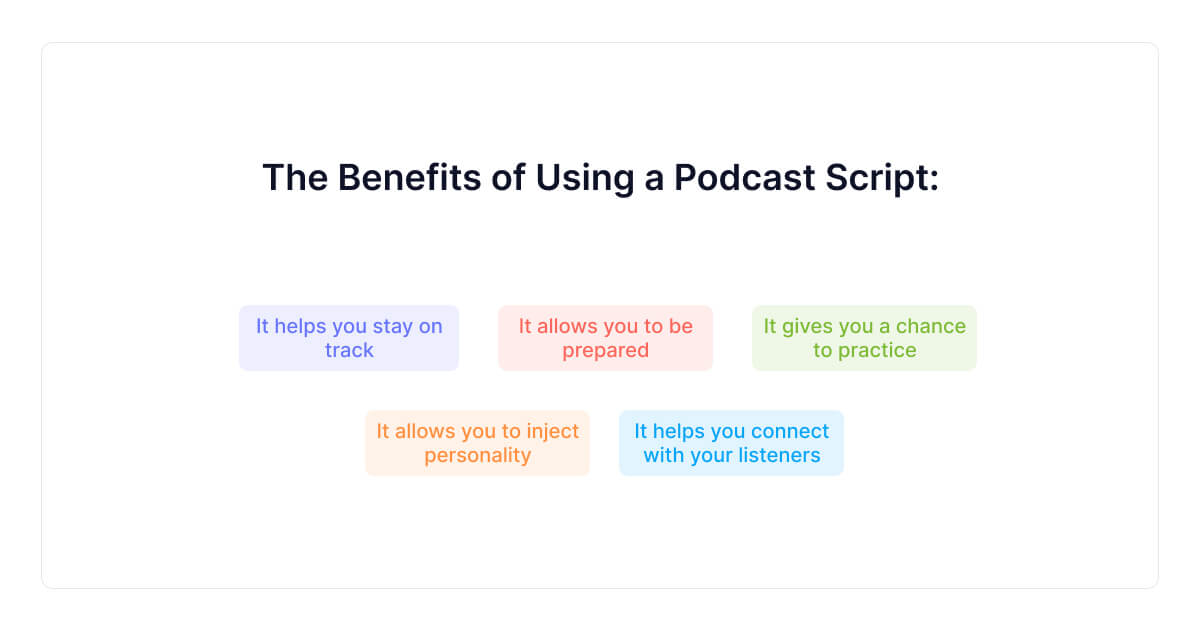
What Are the Key Elements of a Podcast Script?
When crafting a podcast script, several key elements should be included to ensure the podcast is engaging, well-structured, and effective.
Here are some of the most important elements of a podcast script:
- Introduction: A strong introduction helps establish the podcast's tone and purpose and grab the listener's attention.
- Topic Introduction: Introducing the episode's main topic and its relevance helps the listener understand what they will hear.
- Segues: Smooth transitions between different topics or segments help maintain the listener's interest and ensure the podcast flows well.
- Callback: References to earlier segments or stories that underline the main idea of your episode and create cohesion among your audience.
- Listener Engagement: Engaging the listener by asking questions or asking for feedback encourages them to participate, which adds interaction to the podcast.
- Sponsor Message: If there are messages from sponsors, the script should include a well-crafted statement that conveys the message without interrupting the flow of the podcast.
- Outro: A clear and concise outro can wrap up the episode neatly and satisfy the listener.
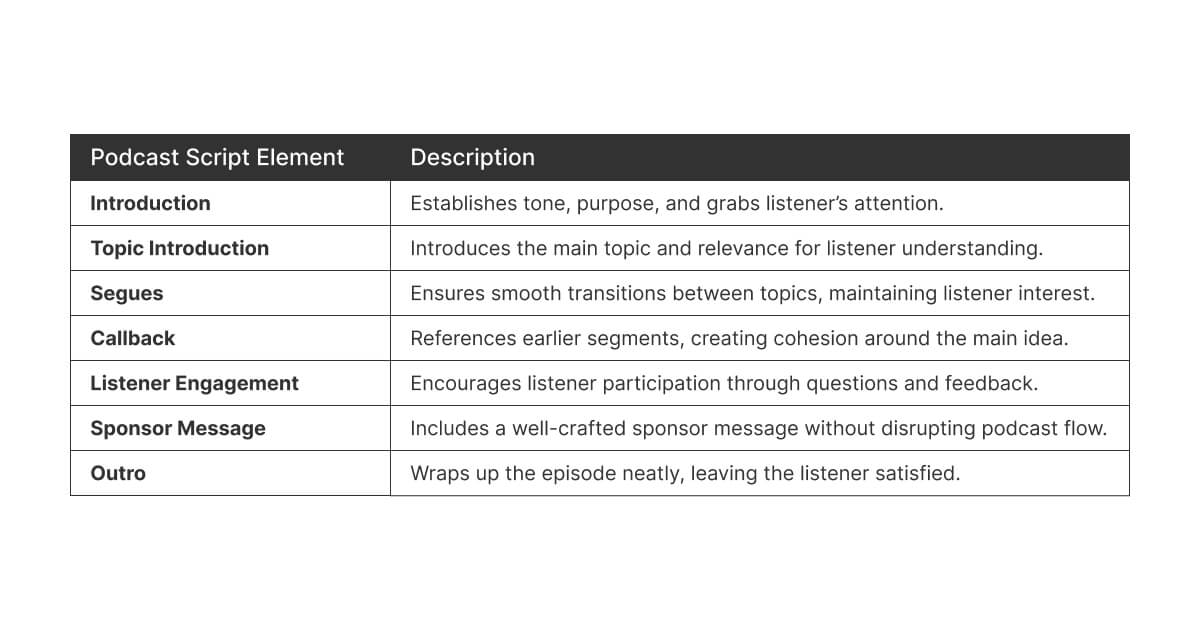
5 Types Of Podcast Scripts
Depending on your requirements and taste, various formats are available for podcast scripts.
Here are the five most common types of podcast scripts and some key features:
- Bullet point approach: In this format, the script consists of bullet points or short phrases that guide the host or guests. This approach provides flexibility and allows for improvisation and spontaneity during the recording process.
- Outline approach: This format provides a more structured approach to podcast scripting. The script has a detailed outline that includes topics, subtopics, and key points for each podcast segment.
- Verbatim script: A verbatim script involves writing out word-for-word what the host or guests will say during the podcast. This approach provides high control over the content and ensures the message is conveyed with the intended wording.
- Solo format: Designed for podcasts hosted by a single person. The script could involve an outline or bullet points, but the host will fill in the details with their insights and commentary.
- Interview style: Involves writing questions for the host to ask their guests and any follow-up questions or prompts. This structure guarantees that all relevant topics are covered and the discussion stays on course.
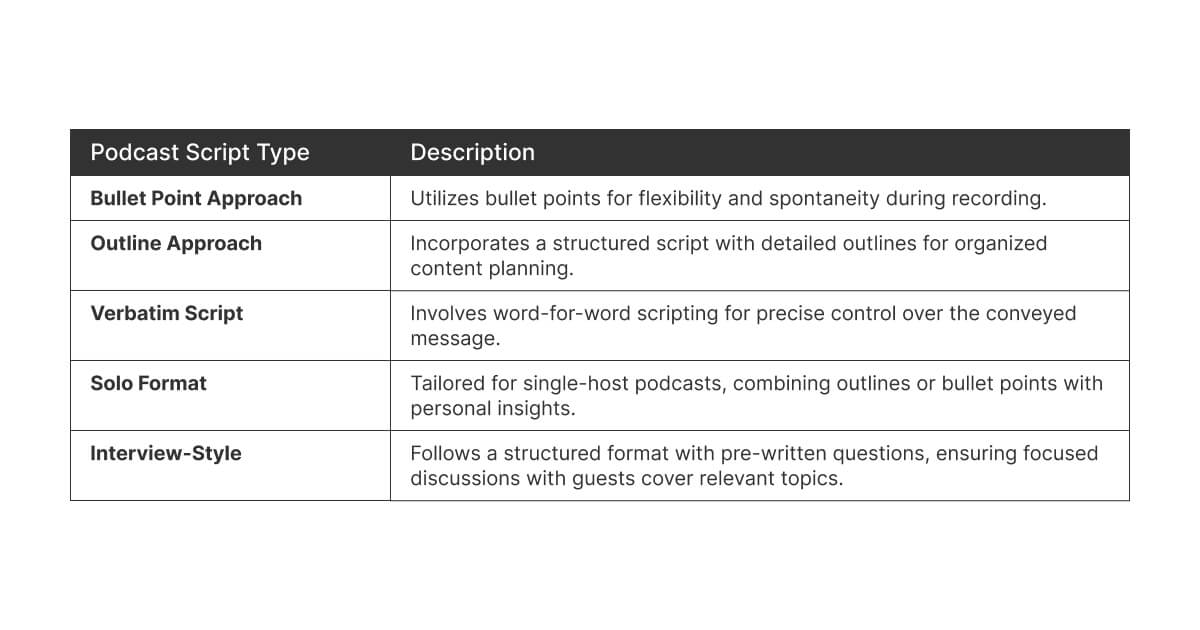
5 Steps to Write a Podcast Script
1. Determine the Podcast Style That Best Fits You
When launching a podcast, one of the most important decisions is determining the style that best fits you and your audience.
Some styles are more interview-based, others might be solo-hosted, and some might combine multiple hosts and guests.
For instance, if you're knowledgeable on a topic, a solo-hosted podcast might be a good fit, while if you are looking to keep things engaging and diverse, an interview-style podcast might be more effective.
You can create a consistent, focused, and high-quality podcast by selecting a style that fits you and your message.
2. Research the Topic or Guests of Your Podcast
Whether it be before inviting a guest or starting to brainstorm episode ideas, thorough research will provide the foundation for a successful and informative podcast.
It is important to research both the broader topic that the episode will focus on and the individual guests you may be interviewing.
By researching the topic of your podcast and your guests ahead of time, you can develop a thoughtful and well-informed discussion that will benefit you and your listeners.
⭐Pro Tip⭐
TextCortex’s Zeno Chat can help you with research for your podcast by accessing real-time information on the web, retrieving relevant files from your database, and using natural language processing to extract insights.
Doing this may produce excellent material for your podcast, and you can gather important information about your topic or guests.
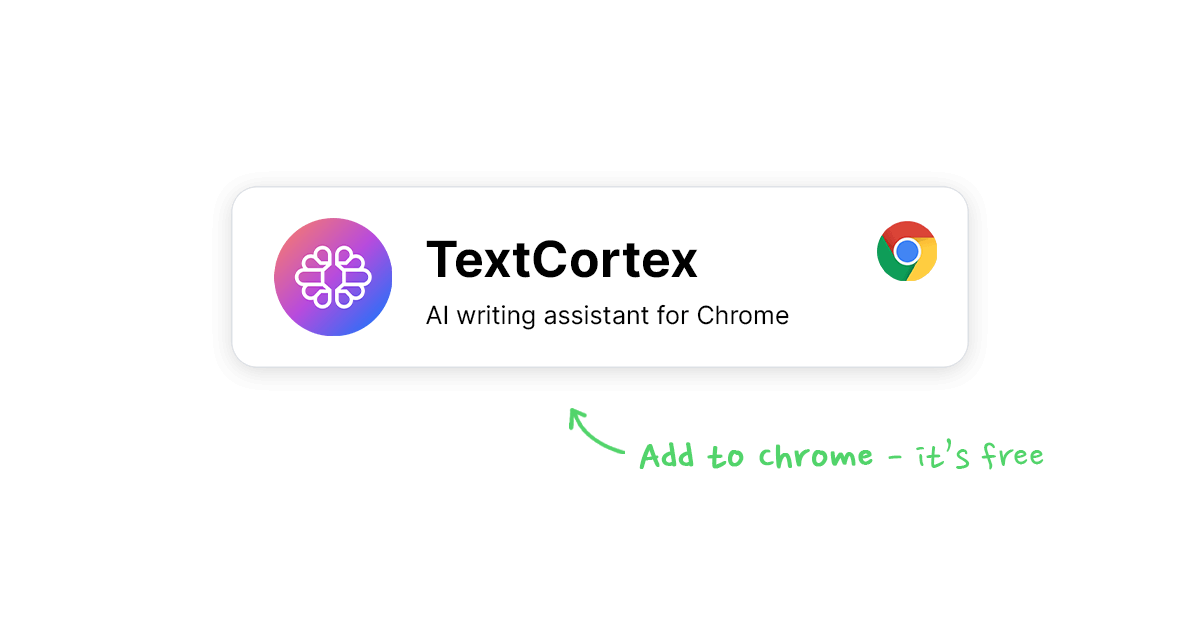
3. Create a Podcast Script Outline
Creating a podcast script outline is essential in podcast production.
It serves as a roadmap for the entire episode, providing structure and clarity to the content.
Here are some tips for creating a podcast script outline:
- Start with the main topic: Identify the episode's main topic and list any subtopics that will be covered.
- Determine the structure: Decide on a structure for the episode, such as an interview-style format or a solo presentation. Be sure to include any segues or transitions needed to move from one topic to the next.
- Flesh out the details: Add more detail to each section of the outline by including important talking points, quotes, and examples.
- Plan for listener engagement: Consider ways to engage the listener, such as asking questions or encouraging interaction through social media.
- Include sponsor messages: If any sponsors or ads are to be included in the podcast, plan for them in the outline.
Example:
[Podcast Title]
Episode [Number]: [Episode Title]
Introduction:
- Greeting and welcome
- Brief overview of the episode theme or topic
- Introduce hosts and any special guests
- Set the tone for the episode
Segment 1: [Segment Title]
- Brief description of the segment
- Key talking points or subtopics
- Discussion and exploration of the main points
- [Optional: Include any relevant interviews, clips, or sound effects]
Sponsor message
Segment 2: [Segment Title]
- Brief description of the segment
- Key talking points or subtopics
- Discussion and exploration of the main points
- [Optional: Include any relevant interviews, clips, or sound effects]
Transition:
- Briefly recap the main points discussed so far
- Convey a smooth transition to the conclusion
Conclusion:
- Summarize the key takeaways from the episode
- Express gratitude to listeners
- Mention any upcoming episodes or events
- Encourage engagement and feedback from listeners
Outro:
- Provide contact information (website, social media, email)
- Thank any special guests and sponsors
- Closing remarks or call-to-action
- [Optional: Outro music or sound effects]
⭐Pro Tip⭐
Zeno Chat's natural language processing features might help you organize your ideas more efficiently and effectively when writing a podcast script outline.
Zeno Chat can assist in brainstorming and creative writing by using natural language processing and customized personas to organize and prioritize your ideas clearly and compellingly for your podcast outline.
Additionally, by accessing real-time information from the web, ZenoChat can provide relevant data and quotes to support your argument, ultimately making your script more engaging.
4. Analyse and Rehearse Your Podcast Script
Once you have created a comprehensive script, it is important to take the time to review it thoroughly and check the clarity, flow, grammar, and punctuation of your podcast script.
Practicing your podcast performance is valuable in ensuring the content is delivered clearly and engagingly.
Practicing also helps with pacing, so it is worth rehearsing the podcast until you or the host are comfortable with the delivery.
Most importantly, reviewing and practicing your podcast script ensures the final product is a polished, well-delivered, professional recording that resonates with the audience.
5. Use AI Tools to Elevate Your Podcast Script Writing
Using advanced technologies, podcast scriptwriters can streamline their writing process, improve the quality of content, and ultimately deliver a more engaging product.
AI tools, from natural language processing to sentiment analysis, offer a range of features that can take your podcast scripts to the next level.
Here are some AI Tools that can elevate your podcast script writing:
- Outlining tools use natural language processing to help you organize your thoughts and structure your podcast more effectively.
- Speech-to-text tools use voice recognition software to transcribe your audio recordings into text, allowing you to edit and revise your script easily.
- Grammar and editing tools use machine learning algorithms to check for grammar, spelling, and syntax errors and suggest improvements to your writing.
- Sentiment analysis tools analyze the tone and mood of your script and can provide insights on how to adjust your content to better resonate with your audience.
- Topic and trend identification tools use machine learning algorithms to identify current and relevant topics that are popular in your industry or niche, inspiring new content.
That’s A Wrap!
Writing any script for the first time is never easy, and having basic knowledge is key in scriptwriting.
If you follow the steps from this guide thoroughly, you have a good cornerstone for future scriptwriting undertakings.
The more time you spend on improving your scriptwriting skills, the easier podcast production will be, and final product quality will only increase as time goes by.
Luckily, TextCortex can help you reduce your time mastering your podcast scriptwriting!
How Can TextCortex Assist You in Podcast Script Writing?
TextCortex is an AI language model that analyzes and generates text using natural language processing techniques.
Here are a few ways it can help you:
🚀Outlining and structuring: Utilizing natural language processing, TextCortex can help you outline and structure your podcast scripts logically and cohesively.
🚀Content creation: With machine learning algorithms, TextCortex can generate writing prompts and assist you in generating content for your podcast efficiently.
🚀Editing and proofreading: TextCortex’s grammar and editing tools can check for syntax errors, typos, and punctuation mistakes, making your podcast scripts more readable and professional.
🚀Research: TextCortex can help you with your podcast research and content quality by providing up-to-date, thorough information from various sources.
🚀Topic identification: TextCortex can identify current and trending topics that relate to your podcast and generate ideas for future episodes, helping you to stay relevant and engaging.
Additionally, TextCortex is
✨Available as WebApp, Google Chrome Extension, and soon to be available as a desktop app for both iOS (already available in beta!) and Windows!
✨Available in over 25+ languages!
✨Offers a freemium plan to try it out and use 20 free creations daily!
Join us today and increase your overall podcast quality!


